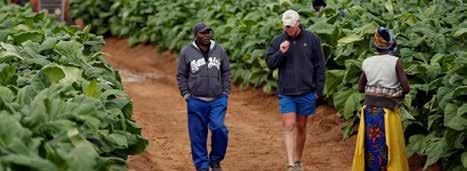
4 minute read
Commercial farmers in Zimbabwe receive compensation
Cold Solutions to construct state-of-the-art storage warehouses in Kenya
The Kenya National Trading Corporation (KNTC) has bought rice worth US $2.8m from farmers in Mwea, Kirinyaga County, following the presidential directive issued in March. A kilogram of rice is being bought at US$0.80 (Ksh.85) and farmers have delivered 9m kilos of their produce to their Mwea MultiPurpose Cooperative Society’s stores. Initially, unprocessed rice sold at US $0.42 (Ksh.45).
Advertisement
Cold Solutions Kenya Limited has announced that it will invest US $70m in constructing stateof-the-art, temperature-controlled cold storage warehouses in the country. The cold storage facilities will be located in Nairobi and Mombasa. The firm will construct Cold Solution’s flagship facility in Tatu City Special Economic Zone in Nairobi.
According to media reports, the 15,000 sqm grade ‘A’ cold storage complex on six acres at Tatu City will be the country’s largest, most advanced and efficient in the region. A typical grade ‘A’ facility is defined as that with high specifications in terms of quality, size (much bigger in scale than typical warehouses), hook height and dock levelers, large lay-down area around the warehouses and specialist facilities such as cold storage. farms during land reform in Zimbabwe will now be getting US$3.5Bn compensation for improvements. This is after Government and the farmers’ representatives yesterday signed a series of agreements in a ceremony presided over by President Mnangagwa. The President described the agreements, bundled as the Global Compensation Deed (GCD), as a milestone that demonstrates the Second Utilizing a combination of local and international specialists, Cold Solutions Kenya’s facility at Tatu City is expected to be operational in 12 to 18 months. It has been flexibly designed to cater for numerous temperature ranges from +26 to -40 C and multiple product ranges, from fresh fruit and vegetables, to pharmaceuticals and vaccines, meats and poultry and frozen foods. The leading temperature-controlled warehouse and logistics service provider is a portfolio company of ARCH Cold Chain Solutions East Africa Fund, a private equity fund advised by ARCH Emerging Markets Partners Limited (ARCH).
The need for cold chain solutions
Even though fruit and vegetable production is a fast-growing sector in Kenya, and it bears considerable local and international market potential, the post-harvest losses of horticulture Republic’s commitment to re-engagement and constitutionalism. Presiding over the signing ceremony of the GCD at State House, President Mnangagwa described the event as historic inasmuch as it closed the land reform chapter and sealed its irreversibility. These sentiments were further echoed by the representative of the farmers who said the agreement sent a clear message to investors that Zimbabweans could work together and that the country was truly crops are far higher than those of cereal crops. It is estimated that 40-60% of fruits and vegetables produced for consumption are lost along the supply chain.
Due to a lack of cold chain solutions in Kenya, most crops are only seasonally available with price variations between peak harvest and low season reaching up to 500% under normal conditions. The creation of extensive and reliable cold chain solutions could greatly impact, in a positive way, food security and economic development. Cold chain solutions can play a major role in minimizing food loss as well as improving food hygiene and public health. It could also be enablers for Kenya to take part in international trade as both consumers and producers.
The creation of extensive and reliable cold chain solutions is essential to ensure food security and economic development. Cold chain solutions can play a major role in minimizing food loss as well as improving food hygiene and public health. These businesses are also enablers for developing countries to take part in international
Commercial farmers in Zimbabwe receive compensation
4000 white commercial farmers who lost their

trade as both consumers and producers. open for business. The funding for the GCD will be mobilised by a team headed by Finance and Economic Development Minister Professor Mthuli Ncube, which includes representatives of the former farmers. The compensation is for infrastructural improvements that the farmers did on farms, which were repossessed at the turn of the millennium to redress colonial imbalances.
These improvements include land clearance, drainage, irrigation trenching, fencing, dams and boreholes, as well as buildings. The agreements were signed by acting Agriculture, Lands and Resettlement Acting Minister Oppah MuchinguriKashiri for the Government and by the Commercial Farmers Union, which represents the farmers affected, plus the Southern African Commercial Farmers Alliance, Valuation Consortium (Pvt) Ltd and the Compensation Steering Committee.
While land was expropriated in the First Republic, the promised compensation for improvements was never paid. However, President Mnangagwa, upon achieving the presidency in 2017, pledged that the Second Republic would entrench constitutionalism, the rule of law and respect for property rights.










